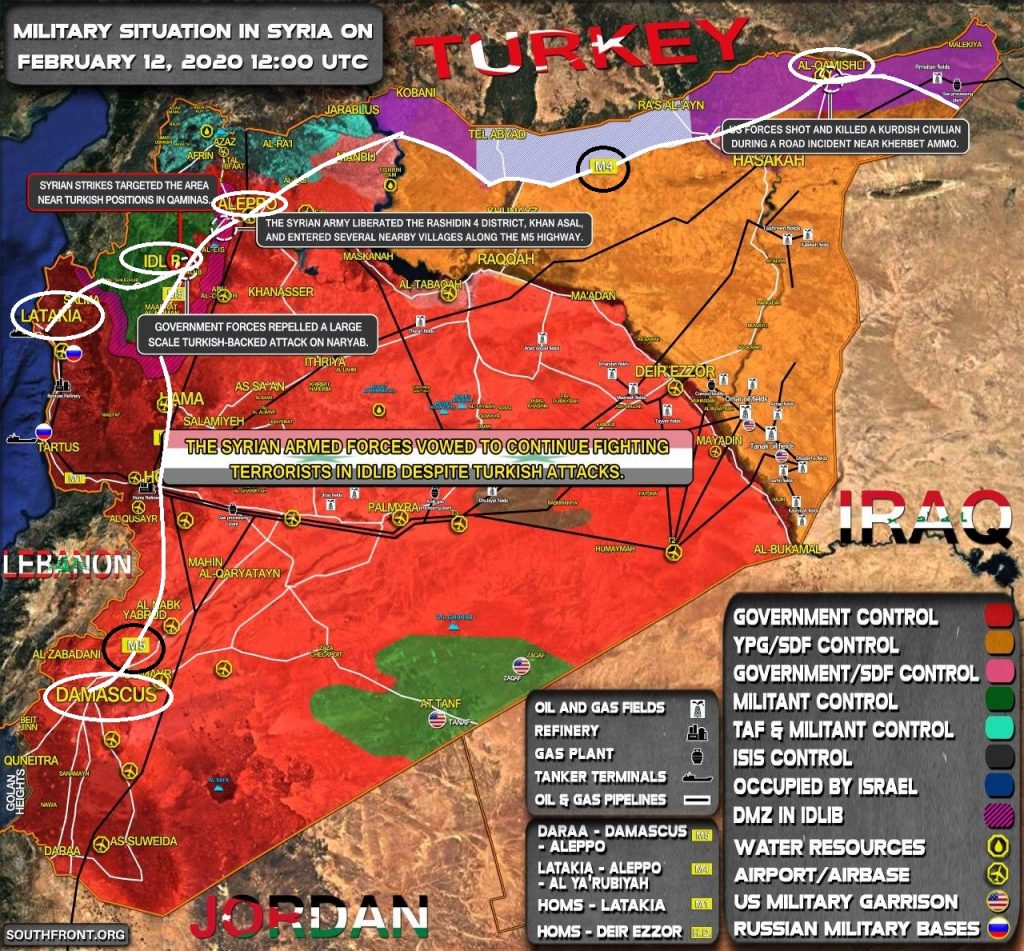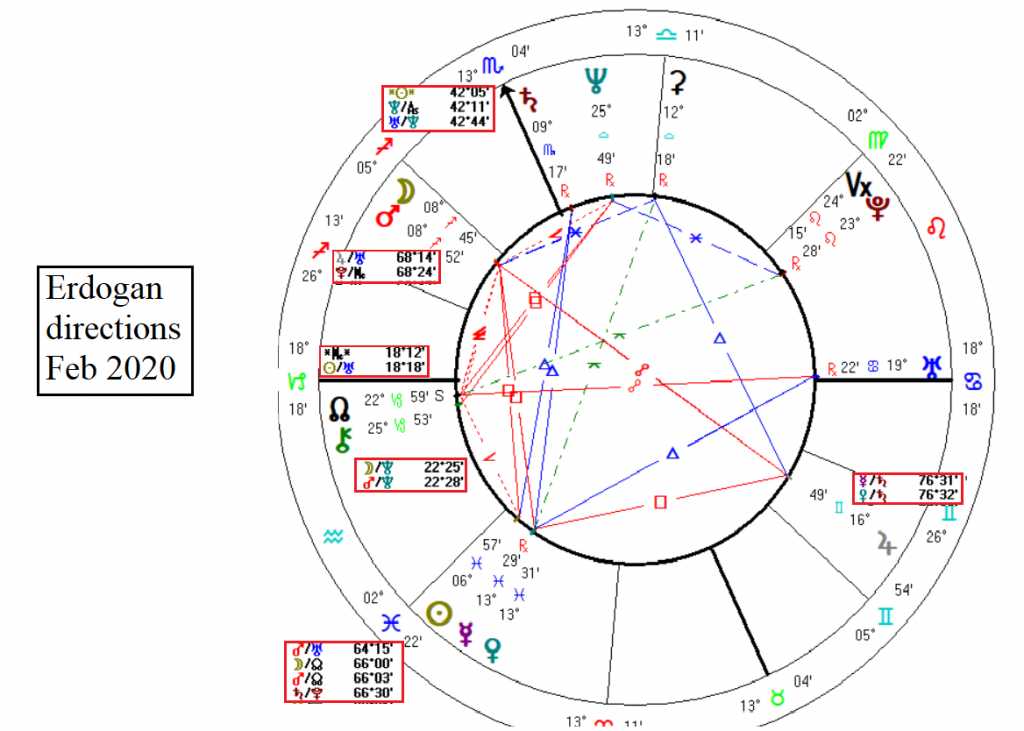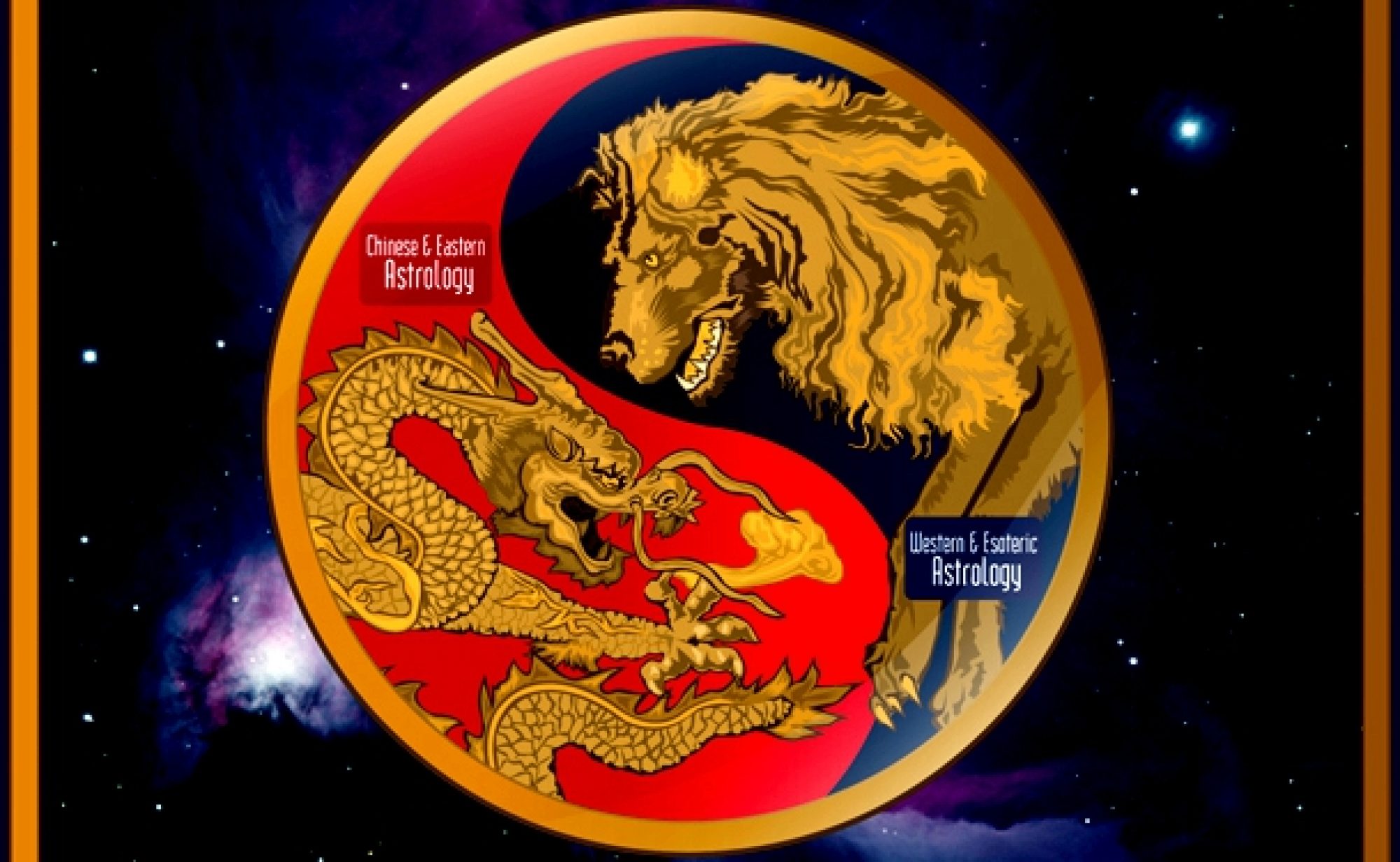On 19 Dec 2019 the Syrian Army (SAA), backed by Russian air support and contingents of Iranian and Hezbollah troops, began a renewed offensive in the Idlib governate of Syria with the aim of enforcing the Sochi Memorandum of Understanding. The ongoing action will clear the M4 and has already cleared the M5 highways that run through Idlib, thus eventually connecting the Russian base at Latakia on the Mediterranean with eastern Syria, as well as connecting Damascus with all points north and east. The action has enraged one Recip Tayyip Erdogan, the wannabe Sultan, for reasons outlined below. He has invested heavily in the takfiri fighters in Idlib. And now all of Aleppo has been liberated. Syrians have been celebrating in the streets and a large number of reinforcements for the SAA are pouring into the region. The question then arises, is the battle for Idlib the Sultan’s Waterloo?
From a recent analysis of Erdogan and his situation:
It is hard to say if Erdogan is running out of choices, friends, time, or all of the above; and his stands on various issues and the contradictions he ploughs through are making his situation increasingly untenable. For the benefit of readers who haven’t heard this before; Erdogan is juggling being a Turkish Muslim reformer who parades under the photos of Turkish secular anti-Muslim nation-builder Mustafa Kemal; an EU-aspiring member and also an aspiring global Sunni leader; an ally of Israel as well as Hamas; an Islamist who is also at odds with the Wahhabi Islamists; a nationalist Turk who wants to curb Kurdish aspirations not only in Syria and Iraq but also in Turkey; a Sunni leader who wants to restore the Sultanate and Caliphate and the fundamentalist Sunni version of anti-Shiite Islam but is also a friend of Shiite Iran; a NATO member with a special relationship with America, and a special friend and ally of Russia.
Idlib is showing up such contradictions in bold relief, and at the very least, is going to be a big reality check for Erdogan. To begin, we have a little background. Idlib is the last stronghold of the opposition forces against Assad in Syria of any consequence, and it is these whom Erdogan has supported. Assad and much of the world see them as terrorists. The Western media paints them as ‘freedom fighters’ and ‘moderate rebels’. They are nothing of the sort. Those fighters have been cobbled together from various regions, in the major part from the Caucasus region and Xinjiang, along with disgruntled Syrians. There are also westerners among their number. They have been given passage through, free movement in and have been paid by Turkey all along. And they are largely indoctrinated in extremist Islam, Wahhabi-style.
The reason these people have come to be concentrated in Idlib is as a result of the SAA and Russian forces clearing the rest of Syria of their kind since 2015. With each major offensive in the past by the SAA, agreements were struck that allowed the takfiri who wanted to live to fight another day to be shipped off to Idlib. Hence, their presence there.
Assad has vowed to return every inch of Syrian territory that existed since its founding back to Syrian control. Idlib has been the last holdout, aside from Afrin and northeast Syria. But the latter two are a different matter. The most hardened fighters against Assad are in Idlib. Once they are routed, it is only a matter of time before the remainder of Syria is liberated. The main push at the moment, as stated, has been to reopen the M4 and M5 highways, which will be a major boost to the Syrian economy and that nation’s rebuilding. The liberation of Aleppo has also opened the international airport there, which will also help. For these reasons, that is also why the fighting there is so intense.
In September of 2018, as part of the Astana Agreement, the Sochi Memorandum of Understanding was signed between Turkey and Russia, which was to create a demilitarized zone (DMZ) of 15 – 25 km depth on both sides of the M4 and M5 highways, which would allow free transport along those roads and, it was hoped, lead to a political solution to the Syrian war. It failed from the very start.
Almost as soon as the ink was dried on the signatures to the agreement, the group calling itself Hayat Tahrir al-Sham (HTS) began infighting among the various terrorist groups in Idlib and eventually consolidated most all of them under its umbrella. HTS is otherwise al-Qaida in Syria re-branded. They then began shelling SAA positions and western Aleppo, as well as attacking the Russian base at Latakia. The Turks set up observation posts (a.k.a. military bases) along the highways, and then did nothing to uphold the agreement. The Syrians and Russians had finally had enough and began enforcement of Astana militarily. The end result in the next months will likely see all of Idlib cleared, and then the southernmost part of Afrin along the M4.
As to why any of this would upset Erdogan, seeing that he agreed to the DMZ, has some rather interesting implications and backstory. The map below will make this clear (bigger):

The M4 and M5 highways are outlined in the heavy white lines, with the major cities circled in white. Aleppo is the main industrial center in Syria. Before the war it was the largest city by population in Syria, but has since slid to 2nd because of fatalities and flight due to its occupation. It was largely liberated in December of 2016 by the SAA, except for western suburbs, which was a major turning point in the war. Now it has been reunited with Damascus via the M5, removing a big blockage toward Syria’s reconstruction. Once the takfiri have been pushed back to a safe distance, traffic along the road can begin to flow. Essentially, that will mean that Idlib will have to be cleared. Then, attention will turn to Afrin, reconnecting Aleppo with eastern Syria.
One big problem with this military enforcement of the Astana agreement is that it throws a wrench in the works of Erdogan’s plans for gains in territory, as well as stopping it being utilized as a training center and safe haven for his takfiri mercenaries. It is those whom he has been shipping off to Libya to reinforce the Muslim Brotherhood-associated government in Tripoli. Therein, too, lies part of his problem with the assault being laid on Idlib, as it reduces the number of fighters there for its defense.
There is another side to the preceding as well, although not so apparent. There are several points to consider:
- Clearing the M4 and M5 highways will give a direct, unimpeded route between Iran and the Mediterranean Sea, connecting Hezbollah, Syria, Iraq and Iran. This has Israel and Washington alarmed.
- Aleppo and the M4 lie along the old Silk Road routes of ancient times, if that rings a bell. Think: China’s Belt and Road Initiative.
- Clearing out Idlib has produced a refugee crisis, pushing civilian refugees into Turkey, which already has 3.8 million of them, something Erdogan can ill-afford at the moment, given the state of Turkey’s economy and politics.
- Sending Turkish reinforcements into Idlib weakens Erdogan’s chances of more troops in Libya, further drains the Turkish economy and puts his plans in the Mediterranean in jeopardy, meaning his plans for Cyprus and oil and gas development in the region. He is losing his mercenaries, who would be used as security forces in Libya and the Mediterranean. It is also developing into a quagmire for him.
- Without those mercenaries, which are also backed by Western powers, the Israelis and several Gulf States, they lose their ability to stir any sort of major destabilization effort in Syria. The only real pressure then would be from economic sanctions.
- Erdogan is seeing his investment in his takfiri going up in flames, his revanchist plans in Syria going up likewise, and his belligerence at the SAA is putting strains on his new-found relations with Russia and Iran.
- Reading between the lines, the reason Erdogan has failed to uphold the Astana agreement, aside from his own pride and playing to public consumption, probably has as much to do with pressures from Washington, to keep the two highways closed, the Russians penned in at the Mediterranean, Syria weak and China and Iran out.
- Lastly, clearing out Idlib will effectively end the Syrian war except for small clean-up operations and allow Syria to stabilize. The so-called ‘Shia Crescent’ would be further solidified and Israel would then be hemmed in to a great extent. Such a crescent would also mean the West loses control over the region’s petroleum reserves to any large extent, making Iran the region’s hegemon.
There is a little bit at stake here for the NATO nations and Israel, to put it mildly. And to a large extent, what happens in the next weeks will hinge largely on Erdogan. The world is watching. If Idlib falls, it is game over for the West, Gulf States and Israelis in Syria for the foreseeable future. It has really been a futile effort for them for well over a year now. A fragile peace will ensue, as well as a political solution for eastern Syria and Syria at large. What shows in the Sultan’s chart, then? His chart with directions is below (bigger):

Keeping this brief, Erdogan is a Piscean, with his Sun conjunct Mercury and Venus, giving his early successes and appeal. This is coupled with his Capricorn rising, showing his ambition, with the ruler (Saturn) elevated in the 9th just behind the MC, bolstering his ambitions. Saturn, in turn, is trine to the Sun, Mercury and Venus, giving him staying power and benefits from old established figures.
The Sun is square to a close Moon/Mars conjunction in Erdogan’s 11th house, in Sagittarius, the latter showing his adventurism, use of religion in his politics and fearless outlook, as well as his ability to forge alliances with colleagues. All this is enhanced – might we say, inflamed? – by a wide opposition between the Moon/Mars conjunction and Jupiter in Gemini. And the latter points to his duplicitous nature, which in turn is inflated by a square between the Mercury/Venus conjunction and Jupiter. The man has expensive tastes.
Erdogan has been known to sit on the fence and play various sides against each other to his advantage. This shows in his playing to both Russia and the US, as well as Iran and Qatar, and even at times with Israel. The problem with sitting on the fence is that it usually winds up getting one painfully in the groin at some point. This is where he finds himself now. He only has himself to blame for his present situation.
At the start of the war in Syria the Western powers thought it would be an easy win, a walk through the daisies. That was until Russia, Iran and Hezbollah came along. Thinking the war would result in a balkanized Syria early on, Erdogan placed his bets on the takfiri, backed them and moved into northern Syria by proxy. His Peace Spring initiative was a reflection of that and a kind of last gasp at grabbing Syrian territory. It has not gone particularly well and he has been halted. Now he is stuck with his proxies and is abandoning them to their fate. A problem there is that a significant number of them travel freely in Turkey, and they are not happy with the Sultan about what is taking place in Idlib.
A quick glance at the directions in Erdogan’s chart initially show the Sun directed to the IC and the MC to the Ascendant. Those two should show successes, right? That would be reinforced by transiting Jupiter across his Ascendant. Big successes, no? Well, no, in fact. What those have done instead is to bring out his megalomania, and that will contribute to bigger problems for him in the months ahead. Not only that, what is showing as a result is the worst of the rhetoric from his government as well, reflecting the negative side of Turkey’s Scorpio personality. Such rhetoric is simply an attempt at face-saving for domestic consumption, though. The SAA is advancing despite Turkish reinforcements. Erdogan’s current troubles are shown in his other directions and transits.
Erdogan had the recent Saturn/Pluto conjunction on his nodal axis, and on his north node, opposite Uranus, which is on his south node. That marked a rupture in his relationships: “The misery of the masses, common suffering shared with many people together.” The SAA push into Idlib has certainly been that. He can no longer sit on the fence. He has to decide, either to launch a counterattack in Idlib, or to abandon his proxies and abide by the Sochi Memorandum. Washington is pushing him to a counterattack. Russia is not giving ground, and they have reason to feel secure. NATO has left him to his fate. Although Erdogan has threatened large retaliations, the Russians are calling his bluff, which is largely what his rhetoric is. He can no longer play at ‘the Sultan of Swing’.
Along with the Saturn/Pluto on his nodal axis, there were some telling directions: Moon/Neptune and Mars/Neptune midpoints, both of which the Saturn/Pluto activated. All this shows emotional shocks, unreliable people, extreme frustration, ‘suffering of the soul’, and then this: “Undermining of associations through lack of stability, unreliability. Weakness of will or negative attitude. Association with weak or sick persons.” He has natal Neptune at the bending of his nodal axis, with the preceding activating that square, which points to his unreliability as a partner and a tendency toward underhanded behaviour at times.
The direction of the MC to his Ascendant is also accompanied by the directed Uranus/Pluto midpoint, which was in effect at the time of the coup attempt against him, that being the prime ‘revolution midpoint’. The events that accompany that midpoint take place around three years before the exact direction, which is what we saw with the attempted coup. Now, the proverbial chickens are roosting. It is exact as of this month and the purge he put in place after that attempt is coming back to bite him.
After the 2016 coup attempt against Erdogan nearly three quarters of Turkey’s airforce pilots were dismissed. The maintenance status of Turkey’s 240 F-16 fighter jets is dubious. It is estimated that less of a quarter of them are ready to fly. The F-16s are no match for the Russian Su-34 jets which cover Syria. They also lack the capabilities to overcome the Russian air defenses. Then there is also Russia’s economic leverage over Turkey.
The latter, Russia’ economic influence, can hurt Turkey. It brought him around after shooting down the Russian jet prior to the 2016 attempted coup. But Russia’s economic leverage pales in comparison to that of the US. The Turkish lira is tied to the US dollar. Turkey’s economy is on the ropes. If Washington so willed, they could destroy Turkey’s economy. Hence, they are using that leverage to agitate Erdogan to act more forcefully in Idlib. At the same time, Erdogan doesn’t trust the Washington establishment, having watched them break agreement after agreement and then what they have done with the Kurds in northeast Syria and Iraq. He has good reason to be suspicious of Washington, yet he needs them to survive economically.
Just how precarious is Erdogan’s situation, then? He may be a wily and tough politician, but that only goes so far when the population (his support base) is hurting in the pocket and fears another influx of refugees. And his forays into the Mediterranean and Libya have only served to stretch the Turkish economy and his armed forces that much further. The chart offers further clues.
The Saturn/Pluto midpoint direction to his Sun is quite telling: “Physical toil and over-exertion, sparing no pains in one’s work. – Renunciation, privation, a physical separation.” This is in distinction to the directed Mars/Node and Moon/Node midpoints, which speak of fortunate unions. But then we remember the Saturn/Pluto conjunction on the nodal axis, and we find that those ‘fruitful associations’ may not be all they are cracked up to be.
Something was broken with Erdogan, as in a break with the past, when that Saturn/Pluto conjunction took place. That is also indicated (not on the chart) by his progressed new moon, which always initiates a new emotional cycle in one’s life. New realities on the ground now take precedence over past dreams for him. This was shown by the transit of Saturn over his Chiron (a classic ‘heartbreak transit’) and square his Neptune, also quite a frustrating transit, after the conjunction with Pluto. He will have to make further adjustments to new circumstances in about a year when the directed Mars/Uranus midpoint comes within orb of his Sun.
Then there are directions to his MC. The directed Sun to his MC normally indicates an achievement and recognition. But there are also the midpoint directions of Neptune/Ascendant and Uranus/Neptune, neither of which helps his status. Instead, they weaken him. The Nep/Asc=MC reads: “The misfortune to suffer from lack of resistance and stamina or from lack of self-control. – The tendency to act under the influence of others, also to lay oneself open to being led astray or corrupted by others.”
The reader can decide who might be misleading him, if so, but Neptune rules his 2nd house, and in this case it is a question of his sense of self-esteem and of finances. It is much the same with the Ura/Nep=MC midpoint: “The growth and development of subconscious forces, inner vision, a peculiar disposition and strange interests. – Unconsciousness, lack of stamina, a nervous breakdown, mourning, dissolution” The dissolution in this case refers to his plans for Syria and to his esteem in the wider world.
The only thing that would save Idlib for Erdogan is a large-scale attack by the US and Israel on the forces actively clearing the region of the takfiri. How likely that would be is…not very. Especially, after the Iranian attack on the al-Assad air base by Iran. That put both Israel and the US on notice, and since then all we see are token strikes in Syria. And there is the little matter of Russian air superiority over Syria and Russian missile cruisers off the coast of Syria. There will be a lot of bloviating by the usual nations – as in “empty sound bubbles from the north” – but little in the way of action.
The US will expect Erdogan to make a concerted effort to push back, but given his situation what he is more likely to do is to make a token show. However, at this point there are reported to be around 9.000 Turkish troops in Idlib and almost 1500 trucks and trailers carrying heavy equipment and tanks have entered the contested areas. It is a dangerous escalation. But with Idlib cleared, it will have political repercussions in Turkey. He has already lost popularity in Turkey because of the economy and people are starting to question why Turkish troops are even in Syria at all. And now body bags with Turkish troops are arriving back home in Turkey.
Idlib and Aleppo mark a turning point, a big one, for the war in Syria and for the fortunes of Erdogan and Israel in the region. These are still early days in the battles, but the SAA has made very quick and considerable progress in just a couple of months, even with Turkish reinforcements and armor being moved into place. When the main city falls, Idlib, as is likely, all that will remain is mopping up and further agreements struck to protect civilians. The main thrust of the offensive has been to reopen the highways, and that is nearly done, and in a comparatively short time. Then, there is Russia and its relations with Erdogan.
In a recent interview the statement was made that perhaps the Russians miscalculated regarding Erdogan and their relationship with him, further saying that Russians typically think they are dealing with rational actors in their foreign policy. This implies Erdogan to irrational. Actually, he knows quite well what he is doing. But at the moment, he is desperate and the threatening rhetoric out of Ankara bears evidence to it.
Conversely, looking from another angle, it could be stated the Russians actually know Erdogan quite well. In dealing with him as they have in Syria, it has bought the SAA time to reorganize, regroup and clear the rest of the country in preparation for the final assaults we are seeing. I doubt they had any illusions about the Sultan’s aspirations.
In terms of their dealings with Erdogan as bilateral partners, the Russians also have leverage over him, as in bilateral trade, the Turkstream gas pipeline, tourism (which is large), and so forth. We saw that leverage even without Turkstream after the Turks shot down the Russian jet a few years ago. Erdogan came around. The attempted coup against him happened shortly after and then relations with the US soured. The difference this time is the deteriorating position in which Erdogan now finds himself politically and economically. He has nowhere to turn, except to either embrace the West or the East. No matter which way he decides, his fortunes have hit a low point.
And then we add to all the preceding his tensions with Greece. As it turns out, tensions will ease with Greece now that he has to pull his troop numbers down off the Greek-Turkish border and out of the Mediterranean, sending them to Idlib. The Greeks have an opening there to apply more pressure. The problem with people under as much stress as Erdogan, though, is that they do not always act in their best interests or the best interests of their neighbors. But, he will be occupied elsewhere other than on Greek-Turkish bilateral relations now for the next months, most likely.
For now, the Sultan needs to get through the Idlib crisis. Then he can see where the ground lay, or what is left of it. It will be a similar situation for Bibi Netanyahu in Israel next month with elections. They both may yet pull something out of the hat, but in terms of ambitions in Syria, Idlib is a big problem for the Sultan, and it may well lead to further difficulties for him in the not-too-distant future, at home and abroad.
As of this writing, the Sultan is turning toward Russia. The US still tries to woo him, and alternatively sanction him. But he learned hard lessons with Washington, from their covert actions with the coup attempt, their double-dealings with the Kurds, their failings in Syria, and then looking at the EU, its instability, as well as the world economic instability, based in the US dollar. It is fairly clear where his long-term fortunes lie, and it is not with the West. These are not the musings of an irrational actor. He is shrewd and calculating. But there is one final point.
Turkey is stated to have the 2nd-largest and 2nd-most powerful military in the NATO alliance, behind the US. What message will it send to the international community if that military cannot hold Idlib, or make a significant difference in Libya, where the Turks also have revanchist ambitions? It shows up the weakness and cracks within the alliance. If the NATO nations cannot rely on the Turkish military for support, what are their realistic expectations for any further adventurism, say, against Russia, for example? Will Washington go it alone? The latter is doubtful, especially now that Congress is tying the hands of Trump against Iran. These are telling times. But in all, we can probably safely say that Idlib is Erdogan’s Waterloo.
Featured pic from Reddit

